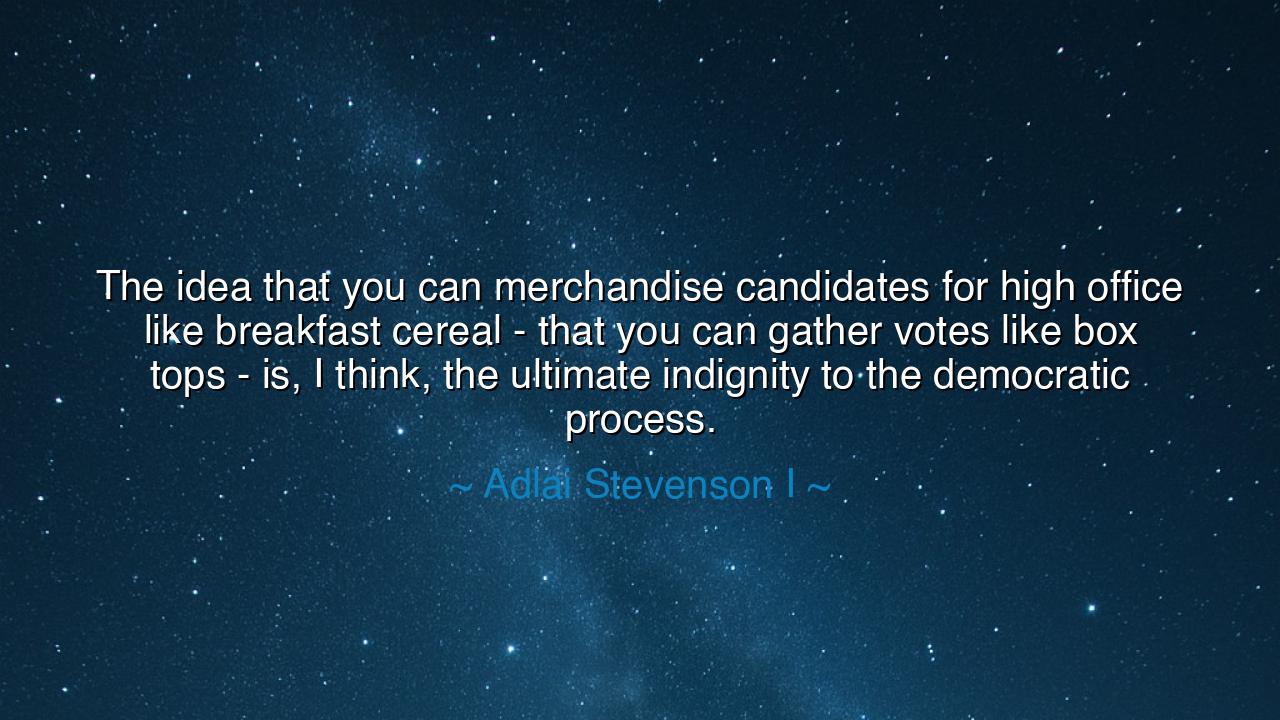
The idea that you can merchandise candidates for high office
The idea that you can merchandise candidates for high office like breakfast cereal - that you can gather votes like box tops - is, I think, the ultimate indignity to the democratic process.






The words of Adlai Stevenson I, though spoken in the modern age, resound with the gravity of the ancients: “The idea that you can merchandise candidates for high office like breakfast cereal—that you can gather votes like box tops—is, I think, the ultimate indignity to the democratic process.” In this cry, Stevenson laments the cheapening of democracy, reduced from sacred duty to commercial spectacle. Leaders, he warns, must not be packaged like goods upon a shelf, adorned with bright slogans and jingles, sold to the people as though governance were but another bargain in the marketplace.
The ancients would have shuddered at such a vision. For in Athens, the cradle of democracy, the citizen was entrusted with the weight of judgment, expected to listen, to deliberate, to discern character and virtue. To treat elections as mere marketing would have been an abomination, for it strips the citizen of reason and the leader of dignity. Stevenson’s metaphor of cereal and box tops unmasks this decline—where campaigns appeal not to thought but to appetite, not to principle but to desire for entertainment.
Consider the story of the Roman Republic in its later years. Candidates for office, once chosen for their service and virtue, began to win votes by bread and circuses. They flattered the people with games, spectacles, and empty promises. Like merchants of popularity, they gathered support not with truth but with glitter. This erosion of dignity led, step by step, to the fall of the Republic and the rise of emperors. Stevenson’s warning is the same: when elections become commodities, the soul of liberty is endangered.
His words also strike at the heart of citizenship. For if leaders are sold like wares, then citizens become mere consumers, passive buyers of images rather than active seekers of justice. The dignity of self-government lies in discernment, in the hard work of understanding issues and weighing character. To gather votes as though they were coupons dishonors both the leader and the led, and it transforms democracy into parody.
Let the generations remember: democracy is not a market stall, nor are its leaders cereal boxes upon a shelf. It is a covenant between the governed and those who govern, demanding integrity, wisdom, and sacrifice. Stevenson’s words are a torch lifted against the darkness of spectacle and deceit, reminding us that the true measure of leadership is not how well one is sold, but how faithfully one serves. If democracy is to endure, it must never be merchandised, but honored as the noblest work of free men and women.






GDGold D.dragon
This quote by Adlai Stevenson I highlights a significant issue with modern politics, where candidates often seem to be marketed and packaged like products rather than chosen for their expertise and ability to lead. How much of this marketing-driven election process is hurting the quality of leadership? Are voters being manipulated by style rather than substance? How can we shift the focus back to the core values of democracy and governance?
TPThao Pham
Stevenson’s perspective is thought-provoking, especially considering the rise of media-driven political campaigns. The comparison to breakfast cereal brings attention to the dehumanizing aspects of modern politics, where candidates are sold as 'products.' Do we risk losing sight of the values and qualities that make a good leader when elections are treated like commercial transactions? How can we ensure that the democratic process remains about governance, not just marketing strategies?
GDGold D.dragon
Stevenson’s quote makes me question how much influence marketing has in the political arena today. It’s troubling to think that voting, something so critical to the future of a nation, has become more about creating a brand than selecting capable leaders. Are we devaluing the essence of democracy when we treat elections like a consumer choice? How can we break free from this consumerist approach to politics and focus on real leadership and accountability?
DLTran Dang Linh
This quote strikes at the heart of how far politics has drifted from its democratic ideals. Is the oversimplification of candidates into sellable 'products' contributing to voter disengagement and apathy? How can we shift the focus from flashy marketing and slogans back to meaningful discourse, where voters understand the true qualifications and ideas of those running for office? Can we ever return to a political system that values substance over style?
TATuyet Nguyen thi anh
Adlai Stevenson I’s quote really highlights how the commercialization of politics undermines the integrity of the democratic process. It’s shocking to think that elections have become so driven by marketing tactics and mass appeal rather than genuine policy discussions. Are we truly choosing leaders based on their vision and ability, or are we simply buying into a product like any other consumer good? How can we restore depth and authenticity to the political process?